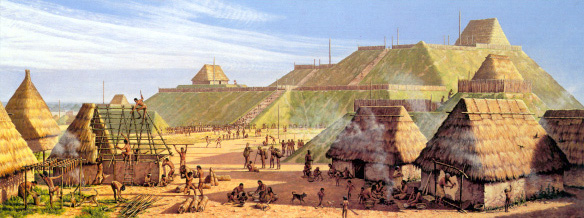Bancroft changed his mind about Cahokia, but not about Indians. To the end of his days he regarded them as "feeble barbarians, destitute of commerce and of political connection." His characterization lasted, largely unchanged, for more than a century. Samuel Eliot Morison, the winner of two Pulitzer Prizes, closed his monumental European Discovery of America (1974) with the observation that Native Americans expected only "short and brutish lives, void of hope for any future." As late as 1987 American History: A Survey, a standard high school textbook by three well-known historians, described the Americas before Columbus as "empty of mankind and its works." The story of Europeans in the New World, the book explained, "is the story of the creation of a civilization where none existed."


7 comments:
Good article. As pointed out elsewhere, the legacy of the idea that the Indians were too degenerate to build mounds has survived in many ways. The Mormon Church was in fact built on this deception.
Good but long....
Andrew Jackson was another one who was in denial about Indians and their capabilities. As he said in his first annual message to Congress, "In the monuments and fortresses of an unknown people, spread over the extensive regions of the West, we behold the memorials of a once powerful race, which was exterminated or has disappeared to make room for the existing savage tribes."
writerfella said: " I always had been enraged that Europeans and European thinkers regarded the pyramids and vast city complexes of central and South America as having been built by others than 'The Native Americans.'"
This idea even survives today, in an altered form popular among New Agers and UFO cultists. Remember "Chariots of the Gods" from the 1970s? The idea was that the ancients (both new world and old) were too primitive to build pyramids in either hemisphere or scratch lines in the dirt at Nazca, so aliens had something to do with it.
In a more recent manifestation, Shirley MacLaine said that the Inca were just not capable of doing a good job fitting stone blocks together, so (guess what) space aliens had a major role in Inca engineering.
Fortunately, scientists now have a good idea how "primitive" people could've built the pyramids, etched the Nazca lines, raised the Easter Island heads, etc.
This kind of claim comes up in my Stereotype of the Month contest occasionally. For instance, Beer Company Suggests Atlanteans Built Wisc. Mounds.
The "asterisk" to this claim being specifically an anti-Native stereotype is that the "ancient astronauts" variety typically believe that aliens were involved with every remarkable ancient building around the world (including Stonehenge and the pyramids in Egypt), not just Western Hemisphere achievements.
True. But except for Egypt's pyramids, most of these claims are about the world's "primitive" or indigenous people. In other words, the claims presume that "civilized" people are smarter than
"uncivilized" people, including Indians.
...which would hardly make a modern Inca feel better when you say "Your ancestors were too dumb to move rocks" and then qualify it with "those proto-Celts in ancient Britain were too savage to have moved the Stonehenge menhirs by themselves".
Post a Comment